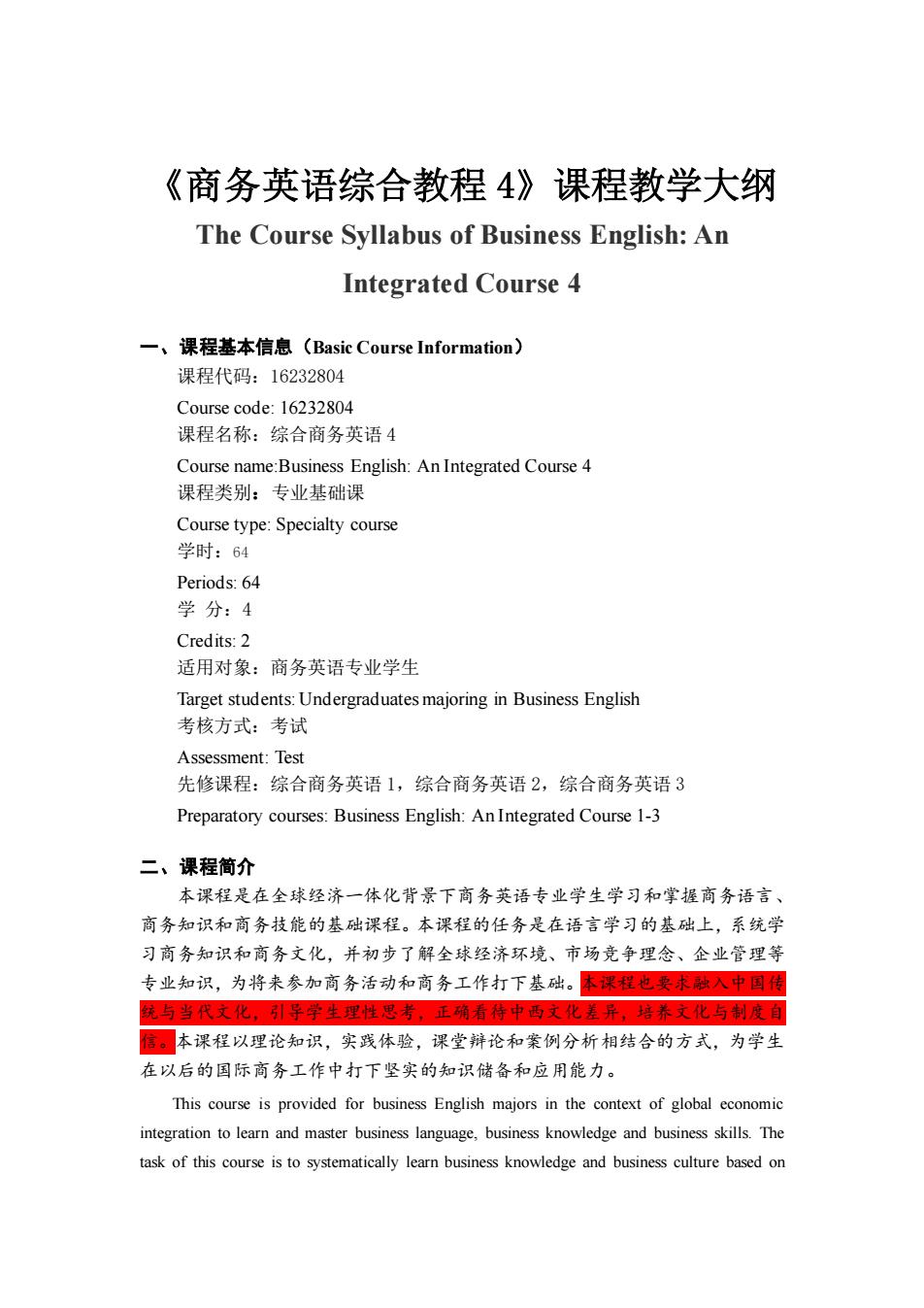
《商务英语综合教程4》课程教学大纲 The Course Syllabus of Business English:An Integrated Course 4 一、课程基本信息(Basic Course Information) 课程代码:16232804 Course code:16232804 课程名称:综合商务英语4 Course name:Business English:AnIntegrated Course 4 课程类别:专业基础课 Course type:Specialty course 学时:64 Periods:64 学分:4 Credits:2 适用对象:商务英语专业学生 Target students:Undergraduates majoring in Business English 考核方式:考试 Assessment:Test 先修课程:综合商务英语1,综合商务英语2,综合商务英语3 Preparatory courses:Business English:AnIntegrated Course 1-3 二、课程简介 本课程是在全球经济一体化背景下商务英语专业学生学习和掌握商务语言、 商务知识和商务技能的基础课程。本课程的任务是在语言学习的基础上,系统学 习商务知识和商务文化,并初步了解全球经济环境、市场竞争理念、企业常理等 专业知识,为将来参加商务活动和商务工作打下基础。本程包要脑人中国 镜与当代文化,导学生理性思考,正确看特中曲文化差异,培养文化与制度自 信本课程以理论知识,实践体验,课堂辩论和案例分析相结合的方式,为学生 在以后的国际商务工作中打下坚实的知识储备和应用能力。 This course is provided for business English majors in the context of global economi integration to learn and master business language,business knowledge and business skills The task of this course is to systematically learn business knowledge and business culture based on
《商务英语综合教程 4》课程教学大纲 The Course Syllabus of Business English: An Integrated Course 4 一、课程基本信息(Basic Course Information) 课程代码:16232804 Course code: 16232804 课程名称:综合商务英语 4 Course name:Business English: An Integrated Course 4 课程类别:专业基础课 Course type: Specialty course 学时:64 Periods: 64 学 分:4 Credits: 2 适用对象:商务英语专业学生 Target students: Undergraduates majoring in Business English 考核方式:考试 Assessment: Test 先修课程:综合商务英语 1,综合商务英语 2,综合商务英语 3 Preparatory courses: Business English: An Integrated Course 1-3 二、课程简介 本课程是在全球经济一体化背景下商务英语专业学生学习和掌握商务语言、 商务知识和商务技能的基础课程。本课程的任务是在语言学习的基础上,系统学 习商务知识和商务文化,并初步了解全球经济环境、市场竞争理念、企业管理等 专业知识,为将来参加商务活动和商务工作打下基础。本课程也要求融入中国传 统与当代文化,引导学生理性思考,正确看待中西文化差异,培养文化与制度自 信。本课程以理论知识,实践体验,课堂辩论和案例分析相结合的方式,为学生 在以后的国际商务工作中打下坚实的知识储备和应用能力。 This course is provided for business English majors in the context of global economic integration to learn and master business language, business knowledge and business skills. The task of this course is to systematically learn business knowledge and business culture based on

language learning.and have a preliminary understanding of the global economic environment. market competition concepts business management and other professional knowledge,soastola the foundation for future participation in business activities and business work.Thus course als uires the integration of Chinese traditional and contemporary culture.guide studenis to thin u This course combines theoretical knowledge,practical experience,classroom debate and case analysis to lay asolid knowledge reserve and application ability for students in future international business work 三、课程性质与教学目的 在学完本课程之后,学生能够: 1.对商务语言的运用及听、说、读、写、译达到专业四八级的水平; 2.了解全球经济一体化背景下,中外商务文化的不同,认识到文化在商务 活动的重要性: 3.根据所学的商务知识进行案例分析: 4.在实际的商务活动中,把所学知识与实践巧妙结合,学以致用 5.熟练翻译科技、金融、法律、合同等商务文本。 6.批判性看待中西文化差异,对中国文化与制度保持自信。 四、教学内容和要求 Unit 1 Media:Fact or Fable (1)目的与要求 By the end of the Unit,the students should be able to: >Understand the main idea of the three texts and construct amental picture of how the media operate in the western world; Research on the ke ey terms related to the Unit Understand and use the expressions picked from the texts. Apply the principles in the textsto a case study. (2)教学内容 The th me of the unit:Understanding how media works in the westem world The skills: Reading:reading for general ideas,specific information,implied meaning Listening:listening for the gist and listening for specific information,listening and note-taking Speaking dis sion,survey,presentation skills Writingbook review Business-oriented skills:case study,research Study skills:howto distinguish between argumentative and expositoryessays Notions:Mainstream media,mass media,elite media,power play
language learning, and have a preliminary understanding of the global economic environment, market competition concepts, business management and other professional knowledge, so as to lay the foundation for future participation in business activities and business work. This course also requires the integration of Chinese traditional and contemporary culture, guide students to think rationally, correctly view the differences between Chinese and Western cultures, and cultivate cultural and institutional self-confidence. This course combines theoretical knowledge, practical experience, classroom debate and case analysis to lay a solid knowledge reserve and application ability for students in future international business work 三、课程性质与教学目的 在学完本课程之后,学生能够: 1. 对商务语言的运用及听、说、读、写、译达到专业四八级的水平; 2. 了解全球经济一体化背景下,中外商务文化的不同,认识到文化在商务 活动的重要性; 3. 根据所学的商务知识进行案例分析; 4. 在实际的商务活动中,把所学知识与实践巧妙结合,学以致用。 5. 熟练翻译科技、金融、法律、合同等商务文本。 6.批判性看待中西文化差异,对中国文化与制度保持自信。 四、教学内容和要求 Unit 1 Media: Fact or Fable (1)目的与要求 By the end of the Unit, the students should be able to: ➢ Understand the main idea of the three texts and construct amental picture of how the media operate in the western world; ➢ Research on the key terms related to the Unit; ➢ Understand and use the expressions picked from the texts. ➢ Apply the principles in the texts to a case study. (2)教学内容 The theme of the unit: Understanding how media works in the western world The skills: Reading:reading for general ideas, specific information, implied meaning Listening:listening for the gist and listening for specific information, listening and note-taking Speaking:discussion, survey, presentation skills Writing:book review Business-oriented skills:case study, research Study skills:howto distinguish between argumentative and expositoryessays Notions: Mainstream media, mass media, elite media, power play

Functions:Expressing opinions,describing the issue(s),making analysis (3)思考与实践 Using the ideas from the texts to conduct a survey on the forms of medi university students are most frequently exposed to.their primary ources to (4)教学方法与手段 课堂讲授与多媒体教学 Unit 2 Originality and Fair Play (1)目的与要求 By the end of the Unit,the students should be able to: Understand the main ided or the three texts and cor fuct a mental picture o the relationship between onginality and competition >Research on the key terms related to the Unit: Understand and use the expressions picked from the texts Apply the principles in the textstoa case study (2)教学内容 The theme of thenit:Understanding the concept of intellectual property and the increasingconcem about the protection of it The skills: Reading:reading for general ideas.specific information implied meaning Speaking:discussion oral report Writing:qu Business iente skills:case study and research Studyskills:etymology Notions:Intellectual property,copyright,patent,plagiarism Functions:Expressing opinions,describing process,making comparisons (3)思考与实践 Use the ideas from the texts to conduct a research on protection ofintellectual property related to intangible cultural heritage and theirowners (4)教学方法与手段 课堂讲授与多媒体教学 Unit 3 National Interest in a WorldCommunity (1)目的与要求
Functions: Expressing opinions, describing the issue(s), making analysis (3)思考与实践 Using the ideas from the texts to conduct a survey on the forms of media university students are most frequently exposed to, their primary sources for information, and their preferred channels to watch movies and why (4)教学方法与手段 课堂讲授与多媒体教学 Unit 2 Originality and Fair Play (1)目的与要求 By the end of the Unit, the students should be able to: ➢ Understand the main idea of the three texts and construct a mental picture of the relationship between originality and competition; ➢ Research on the key terms related to the Unit; ➢ Understand and use the expressions picked from the texts. ➢ Apply the principles in the texts to a case study. (2)教学内容 The theme of the unit:Understanding the concept of intellectual property and the increasingconcern about the protection of it The skills: Reading:reading for general ideas, specific information implied meaning Speaking:discussion, oral report Writing:quoting effectively and avoiding plagiarism Business-oriented skills:case study and research Studyskills:etymology Notions: Intellectual property, copyright, patent, plagiarism Functions: Expressing opinions, describing process, making comparisons (3)思考与实践 Use the ideas from the texts to conduct a research on protection ofintellectual property related to intangible cultural heritage and theirowners (4)教学方法与手段 课堂讲授与多媒体教学 Unit 3 National Interest in a WorldCommunity (1)目的与要求
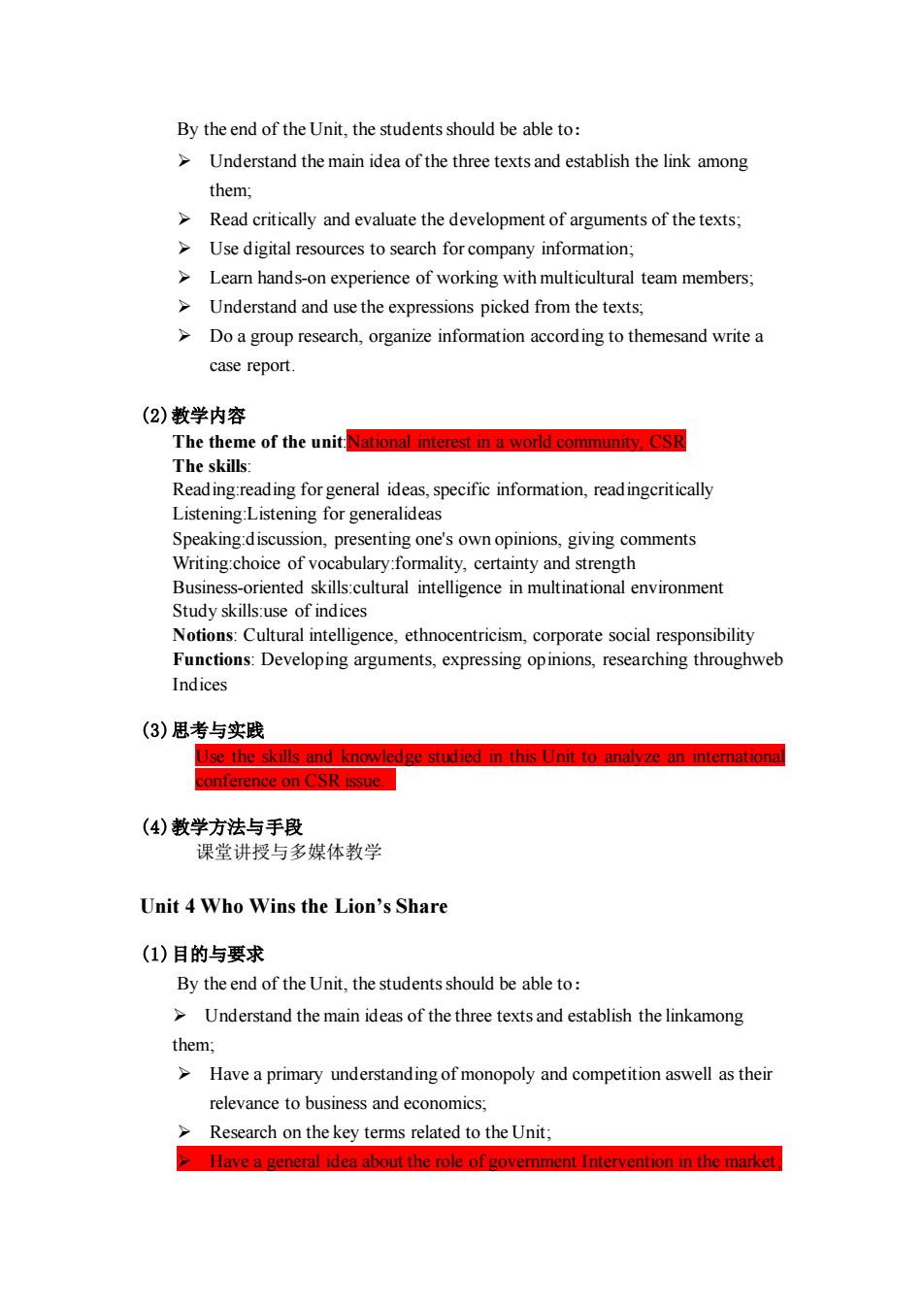
By the end of the Unit,the students should be able to: Understand the main idea of the three texts and establish the link among them Read critically and evaluate the development of arguments of the texts; Use digital resources to search for company information; Learn hands-on experience of working with multicultural team members; Understand and use the expressions picked from the texts >Do a group research,organize information according to themesand write a case report (2)教学内容 The theme of the unit:Natonal interest in a world community.CSR The skills: Reading:reading for general ideas,specific information,readingcritically Listening:Listening for generalideas esenting one's own opinions,giving omment Business-oriented skills:cultural intelligence in multinational environment Study skills:use of indices Notions:Cultural intelligence.ethnocentricism,corporate social responsibility Functions:Developing arguments,expressing opinions,researching throughweb Indices (3)思考与实践 Use the skills and knowledge studied in this Unit to analyze an international 0 oference。nCQ2sce (4)教学方法与手段 课堂讲授与多媒体教学 Unit 4 Who Wins the Lion's Share (1)目的与要求 By the end of the Unit,the students should be able to: >Understand the main ideas of the three texts and establish the linkamong them; Have a primary understanding of monopoly and competition aswell as thei relevance to business and economics; Research on the key terms related to the Unit; Have a ge he role of govemment Interv ntion in the market
By the end of the Unit, the students should be able to: ➢ Understand the main idea of the three texts and establish the link among them; ➢ Read critically and evaluate the development of arguments of the texts; ➢ Use digital resources to search for company information; ➢ Learn hands-on experience of working with multicultural team members; ➢ Understand and use the expressions picked from the texts; ➢ Do a group research, organize information according to themesand write a case report. (2)教学内容 The theme of the unit:National interest in a world community, CSR The skills: Reading:reading for general ideas, specific information, readingcritically Listening:Listening for generalideas Speaking:discussion, presenting one's own opinions, giving comments Writing:choice of vocabulary:formality, certainty and strength Business-oriented skills:cultural intelligence in multinational environment Study skills:use of indices Notions: Cultural intelligence, ethnocentricism, corporate social responsibility Functions: Developing arguments, expressing opinions, researching throughweb Indices (3)思考与实践 Use the skills and knowledge studied in this Unit to analyze an international conference on CSR issue. (4)教学方法与手段 课堂讲授与多媒体教学 Unit 4 Who Wins the Lion’s Share (1)目的与要求 By the end of the Unit, the students should be able to: ➢ Understand the main ideas of the three texts and establish the linkamong them; ➢ Have a primary understanding of monopoly and competition aswell as their relevance to business and economics; ➢ Research on the key terms related to the Unit; ➢ Have a general idea about the role of government Intervention in the market;
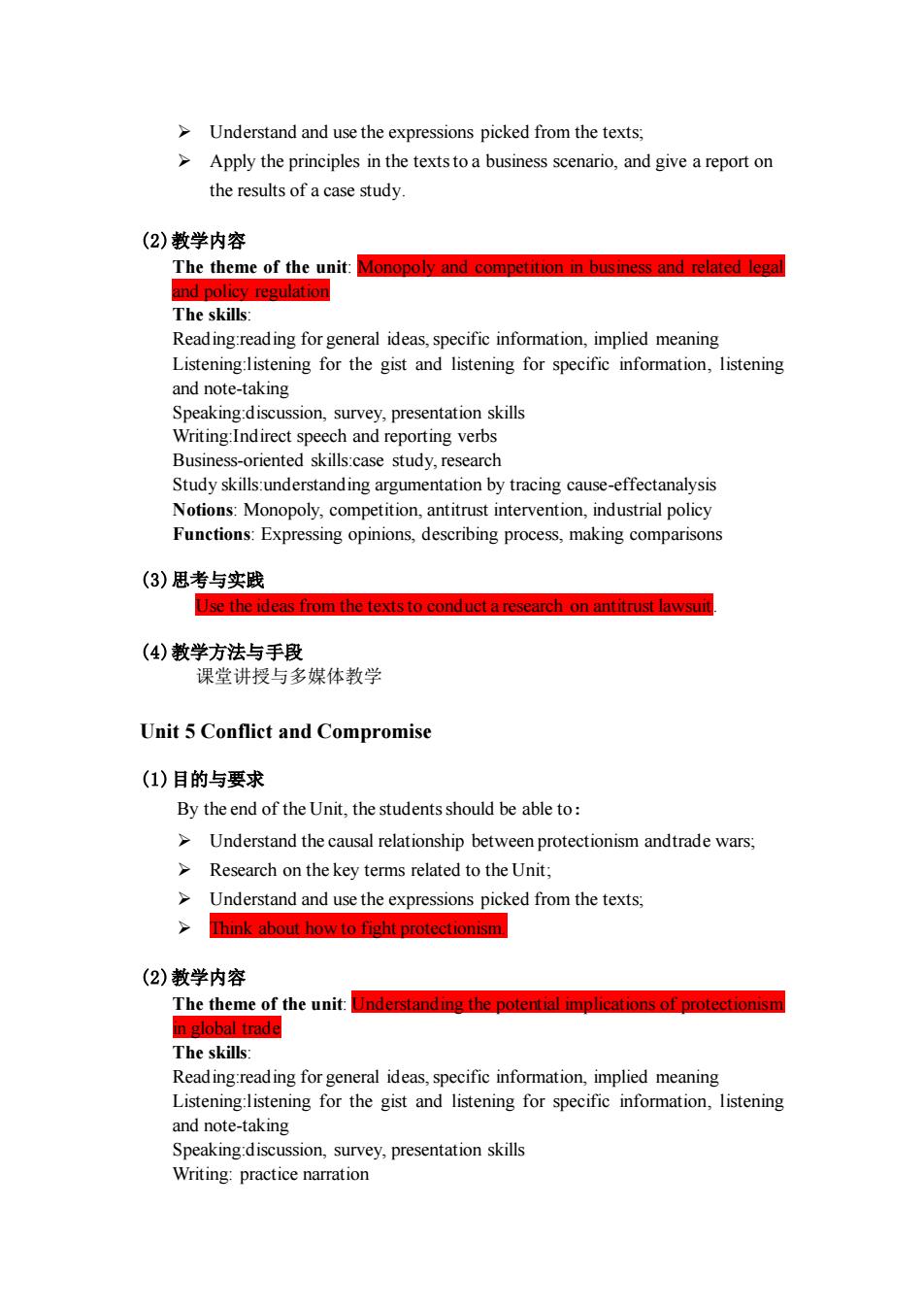
>Understand and use the expressions picked from the texts; Apply the principles in the textstoa business scenario,and give a report on the results of a case study (2)教学内容 The theme of the unit:Monopoly and competition in busmness and related legal and policy regulation The skills Reading:reading for general ideas,specific information,implied meaning Listening:listening for the gist and listening for specific information,listening and note-taking Speaking:discussion.survey.presentation skills Writing:Indirect speech and re porting verbs Busine orier case study,research Study skills:understanding argumentation by tracing cause-effectanalysis Notions:Monopoly,competition,antitrust intervention,industrial policy Functions:Expressing opinions.describing process.making comparisons (3)思考与实践 Use the ideas from the texts to conduct a research on antitrust lawsunt (4)教学方法与手段 课堂讲授与多媒体教学 Unit 5 Conflict and Compromise (1)目的与要求 By the end of the Unit,the students should be able to: Understand the causal relationship between protectionism andtrade wars. Research on the key terms related to the Unit >Understand and use the expressions picked from the texts; Think about how to fight protectionism (2)教学内容 The theme of the unit:Understanding the po in global trade The skills: Reading:reading for general ideas,specific information,implied meaning Listening:listening for the gist and listening for specific information,listening and note-tak ng Speaking discussion,survey,presentation skill Writing:practice narration
➢ Understand and use the expressions picked from the texts; ➢ Apply the principles in the texts to a business scenario, and give a report on the results of a case study. (2)教学内容 The theme of the unit: Monopoly and competition in business and related legal and policy regulation The skills: Reading:reading for general ideas, specific information, implied meaning Listening:listening for the gist and listening for specific information, listening and note-taking Speaking:discussion, survey, presentation skills Writing:Indirect speech and reporting verbs Business-oriented skills:case study, research Study skills:understanding argumentation by tracing cause-effectanalysis Notions: Monopoly, competition, antitrust intervention, industrial policy Functions: Expressing opinions, describing process, making comparisons (3)思考与实践 Use the ideas from the texts to conduct a research on antitrust lawsuit. (4)教学方法与手段 课堂讲授与多媒体教学 Unit 5 Conflict and Compromise (1)目的与要求 By the end of the Unit, the students should be able to: ➢ Understand the causal relationship between protectionism andtrade wars; ➢ Research on the key terms related to the Unit; ➢ Understand and use the expressions picked from the texts; ➢ Think about how to fight protectionism. (2)教学内容 The theme of the unit: Understanding the potential implications of protectionism in global trade The skills: Reading:reading for general ideas, specific information, implied meaning Listening:listening for the gist and listening for specific information, listening and note-taking Speaking:discussion, survey, presentation skills Writing: practice narration

Business-oriented skills:critical thinking.research Study skills compound adj ctives Notions:Interational trade,import,export;economics,curency Functions:Evaluating arguments,expressing opinions,making a suggestion (3)思考与实践 Inderstand the husiness mles in interational trade d the significance of compromise and cooperation mn intemation leam to o serve and think in a cnitical wa (4)教学方法与手段 课堂讲授与多媒体教学 Unit 6 Law and Order (1)目的与要求 By the end of the Unit,the students should be able to: >Understand the main idea of the three texts and construct a mental picture of how lawoperates in the westem world Research on the key terms related to the Unit: >Understand and use the expressions picked from the texts. A Apply the principles in the textstoa case study (2)教学内容 e of the unit:he Read ing:reading for attitudes Writing:ways to end a paragraph Listening:listening for implied meaning Speakingm Busine Study skills:use of corpus Notions:Economic sanction,embargo,boycott,restriction functions Summarizing different opinions, explaining reasons, makingpredictions (3)思考与实践 Use the ideas from the three texts to conduct a r raised by the United States against Iran.Cuba ete (4)教学方法与手段 课堂讲授与多媒体教学
Business-oriented skills:critical thinking, research Study skills:compound adjectives Notions: International trade, import, export; economics, currency Functions: Evaluating arguments, expressing opinions, making a suggestion (3)思考与实践 Understand the business rules in international trade; understand the significance of compromise and cooperation in international trade; learn to observe and think in a critical way (4)教学方法与手段 课堂讲授与多媒体教学 Unit 6 Law and Order (1)目的与要求 By the end of the Unit, the students should be able to: ➢ Understand the main idea of the three texts and construct a mental picture of how lawoperates in the western world; ➢ Research on the key terms related to the Unit; ➢ Understand and use the expressions picked from the texts. ➢ Apply the principles in the texts to a case study. (2)教学内容 The theme of the unit: The controversies about freedom and regulation The skills: Reading:reading for attitudes Writing:ways to end a paragraph Listening:listening for implied meaning Speaking:making comments Business-oriented skills:case study, research Study skills:use of corpus Notions: Economic sanction, embargo, boycott, restriction Functions: Summarizing different opinions, explaining reasons, makingpredictions (3)思考与实践 Use the ideas from the three texts to conduct a research on economic sanctions raised by the United States against Iran, Cuba, etc. (4)教学方法与手段 课堂讲授与多媒体教学
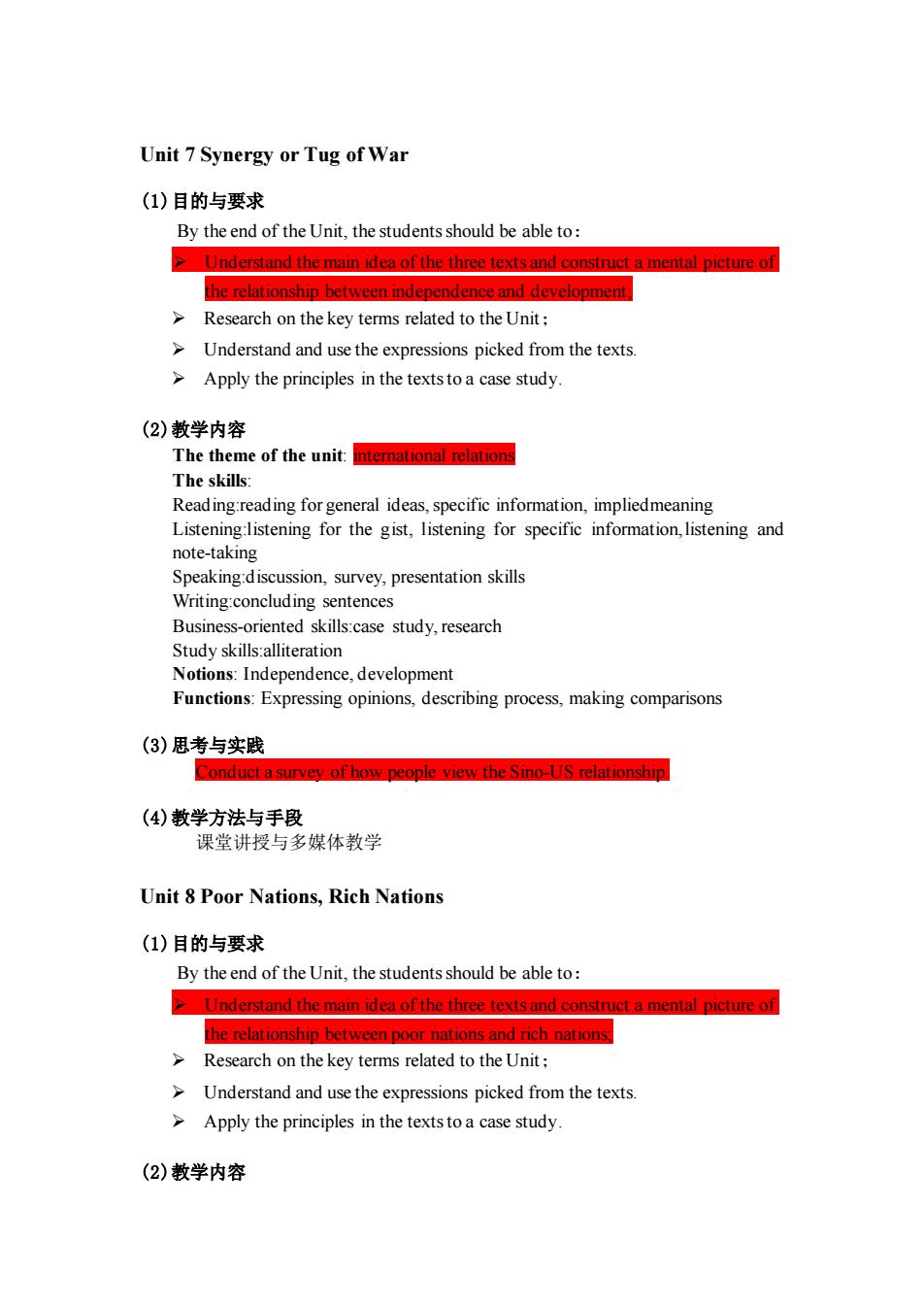
Unit 7 Synergy or Tug of War (1)目的与要求 By the end of the Unit,the students should be able to: Understand the mamn idea of the three texts and constru the relationship between independence and development Research on the key terms related to the Unit: Understand and use the expressions picked from the text >Apply the principles in the textsto a case study. (2)教学内容 The theme of the unit:ntematonal relatons The skills Readingreading ion,impliedmeaning Listening:listening for the gist,listening for specific information,listening and note-taking Speaking:discussion,survey,presentation skills Writingconcluding sentences oriented skills:case study,research Notions:Independence.development Functions:Expressing opinions,describing process,making comparisons (3)思考与实践 Conduct a survey of how people view the Sino-US relationship (4)教学方法与手段 课堂讲授与多媒体教学 Unit 8 Poor Nations,Rich Nations (1)目的与要求 By the end of the Unit,the students should be able to: Understand the main idea of the three texts and cons the relationship between poor nations and nich nations. Research on the key terms related to the Unit: Understand and use the expressions picked from the texts Apply the principles in the textstoa case study. (2)教学内容
Unit 7 Synergy or Tug of War (1)目的与要求 By the end of the Unit, the students should be able to: ➢ Understand the main idea of the three texts and construct a mental picture of the relationship between independence and development; ➢ Research on the key terms related to the Unit; ➢ Understand and use the expressions picked from the texts. ➢ Apply the principles in the texts to a case study. (2)教学内容 The theme of the unit: international relations The skills: Reading:reading for general ideas, specific information, impliedmeaning Listening:listening for the gist, listening for specific information,listening and note-taking Speaking:discussion, survey, presentation skills Writing:concluding sentences Business-oriented skills:case study, research Study skills:alliteration Notions: Independence, development Functions: Expressing opinions, describing process, making comparisons (3)思考与实践 Conduct a survey of how people view the Sino-US relationship. (4)教学方法与手段 课堂讲授与多媒体教学 Unit 8 Poor Nations, Rich Nations (1)目的与要求 By the end of the Unit, the students should be able to: ➢ Understand the main idea of the three texts and construct a mental picture of the relationship between poor nations and rich nations; ➢ Research on the key terms related to the Unit; ➢ Understand and use the expressions picked from the texts. ➢ Apply the principles in the texts to a case study. (2)教学内容
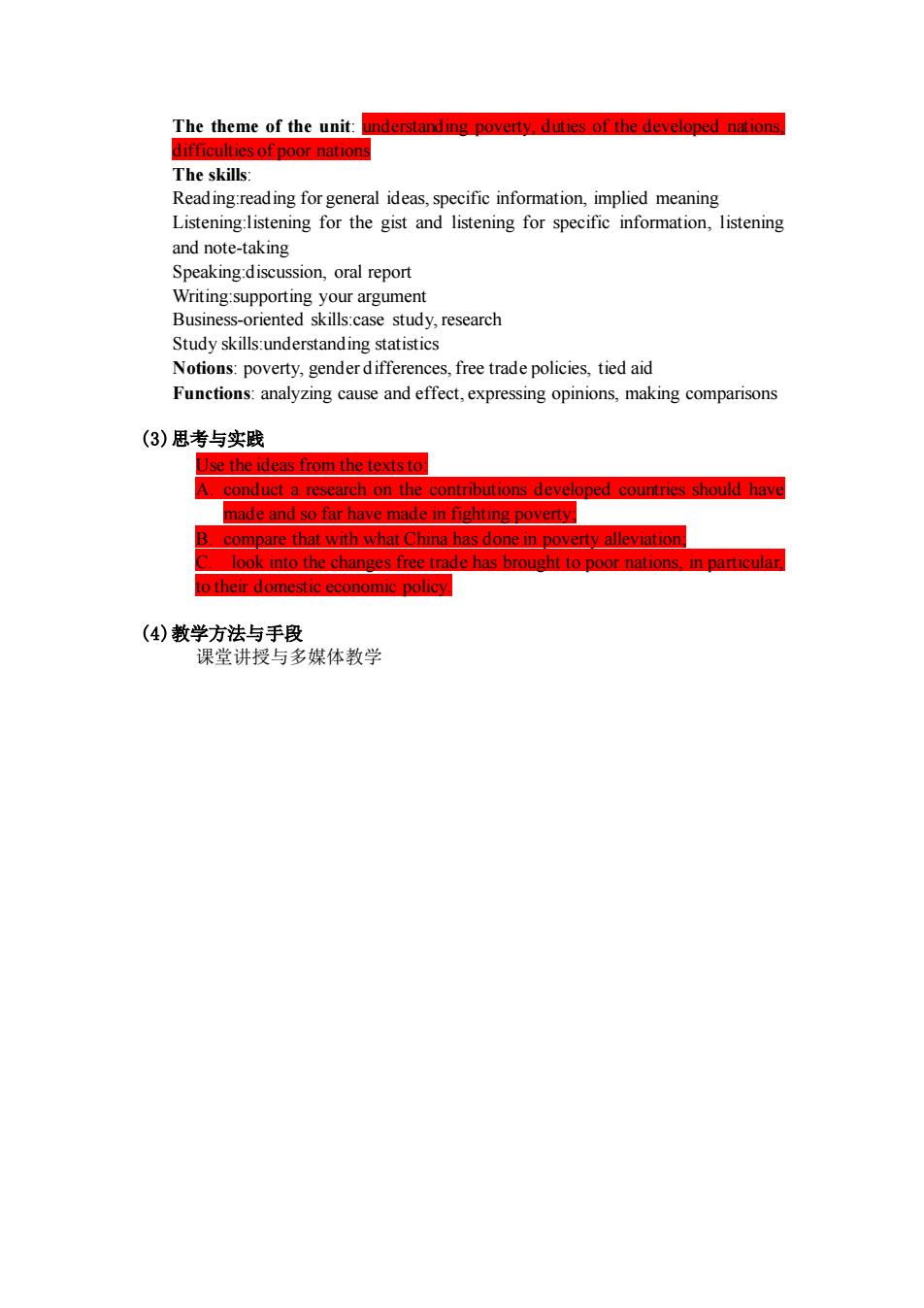
The theme of the unit:understanding poverty dutes of the developednon of poor nation The skills. Reading:reading for general ideas,specific information,implied meaning Listening:listening for the gist and listening for specific information,listening and note-taking Speaking dis ssion,oral report Study skills:understanding statistics Notions:poverty,genderdifferences,free trade policies,tied aid Functions:analyzing cause and effect,expressing opinions,making comparisons (3)思考与实践 Use the ideas from the texts to A conduct a research on the contributions developed countries should have made and so far have made in fighting povertyl that with what china has do to ther (4)教学方法与手段 课堂讲授与多媒体教学
The theme of the unit: understanding poverty, duties of the developed nations, difficulties of poor nations The skills: Reading:reading for general ideas, specific information, implied meaning Listening:listening for the gist and listening for specific information, listening and note-taking Speaking:discussion, oral report Writing:supporting your argument Business-oriented skills:case study, research Study skills:understanding statistics Notions: poverty, gender differences, free trade policies, tied aid Functions: analyzing cause and effect, expressing opinions, making comparisons (3)思考与实践 Use the ideas from the texts to: A. conduct a research on the contributions developed countries should have made and so far have made in fighting poverty; B. compare that with what China has done in poverty alleviation; C. look into the changes free trade has brought to poor nations, in particular, to their domestic economic policy. (4)教学方法与手段 课堂讲授与多媒体教学

五、各教学环节学时分配 教学环节 习 小 教学时数 包 实验 其他教 课 学环节 计 课程内容 Unit I Media:Fact or 4 2 Fable Unit2 Originality and Fair 1 8 Play Unit3 National Interest in a World Community Unit 4 Who Wins the Lion's Share Unit5 Conflict and Compromise Unit6 Law and Order Unit7 Synergy or Tug of War Unit8 Poor Nations,Rich 2 8 Nations 合计 32 16 64
五、各教学环节学时分配 教学环节 教学时数 课程内容 讲 课 习 题 课 讨 论 课 实验 其他教 学环节 小 计 Unit 1 Media:Fact or Fable 4 2 1 1 8 Unit 2 Originality and Fair Play 4 2 1 1 8 Unit 3 National Interest in a World Community 4 2 1 1 8 Unit 4 Who Wins the Lion's Share 4 2 1 1 8 Unit 5 Conflict and Compromise 4 2 1 1 8 Unit 6 Law and Order 4 2 1 1 8 Unit 7 Synergy or Tug of War 4 2 1 1 8 Unit 8 Poor Nations,Rich Nations 4 2 1 1 8 合计 32 16 8 8 64

六、推荐教材和教学参考资源 1.《商务英语综合教程4》(第二版)学生用书,王立非(主编),上海外语 教有出版社,2019: 2.《商务英语综合教程4》(第二版)教师用书,王立非(主编),上海外 语教育出版社,2019: 青《习近平演国厘处》点三外文出版让20们0年6月 4X1 Jinping:The Govemance of China.Volume I11,外文出版社,2020年d 月: 5.《现代英语语法》,赵俊英,商务印书馆,2006年9月: 6.《英语常用河疑难用法手册》,陈用仪,浙江大学出版社,2010年6月: 7.A Comprehensive Grammar of the English Language,Randolph Quirk et al,Longman Group Limited,1985: 8.Longman Grammar of Spoken and Written English,Douglas Biber,Stig Johansson,Geoffrey Leech&Edward Finegan,Longman Group Limited,1999: 9.www.the freedictionary.com 七、其他说明 授课老师可以根据各章节有侧重点进行授课,可根据实际情况调整课学时 分配。 大钢修订人:余新兵 修订日期:2020.12.23 火敬 2023.1.30 大纲审定人: 审定日期:
六、推荐教材和教学参考资源 1. 《商务英语综合教程 4》(第二版)学生用书,王立非(主编),上海外语 教育出版社,2019; 2. 《商务英语综合教程 4》(第二版)教师用书,王立非(主编),上海外 语教育出版社,2019; 3.《习近平谈治国理政》卷三,外文出版社,2020 年 6 月. 4. Xi Jinping: The Governance of China,Volume III,外文出版社,2020 年 6 月; 5. 《现代英语语法》,赵俊英,商务印书馆,2006 年 9 月; 6. 《英语常用词疑难用法手册》,陈用仪, 浙江大学出版社, 2010 年 6 月; 7. A Comprehensive Grammar of the English Language, Randolph Quirk et al,Longman Group Limited, 1985; 8. Longman Grammar of Spoken and Written English, Douglas Biber, Stig Johansson, Geoffrey Leech & Edward Finegan, Longman Group Limited,1999; 9. www.the freedictionary.com 七、其他说明 授课老师可以根据各章节有侧重点进行授课,可根据实际情况调整授课学时 分配。 大纲修订人: 余新兵 修订日期:2020.12.23 火敬 2023.1.30 大纲审定人: 审定日期: